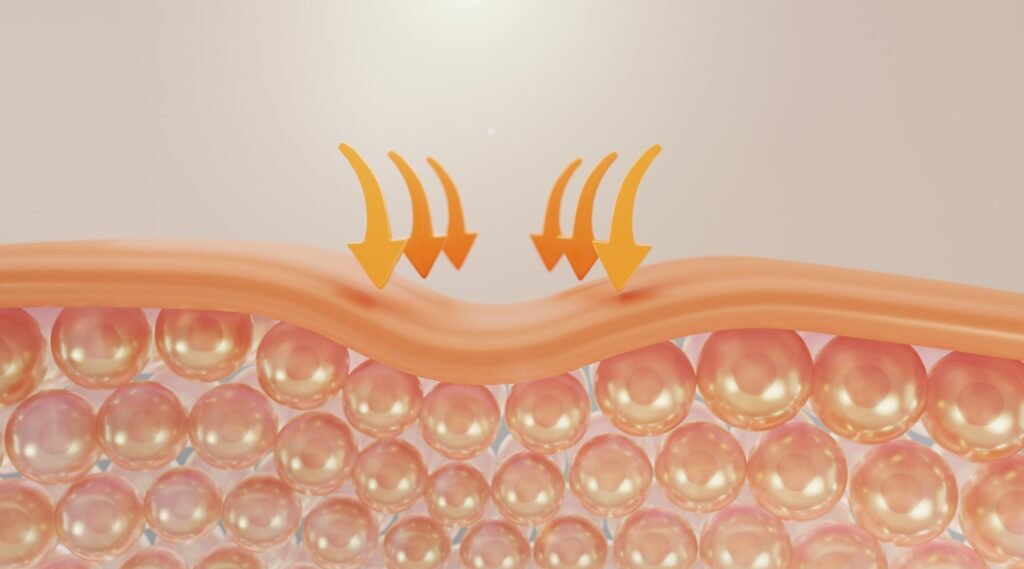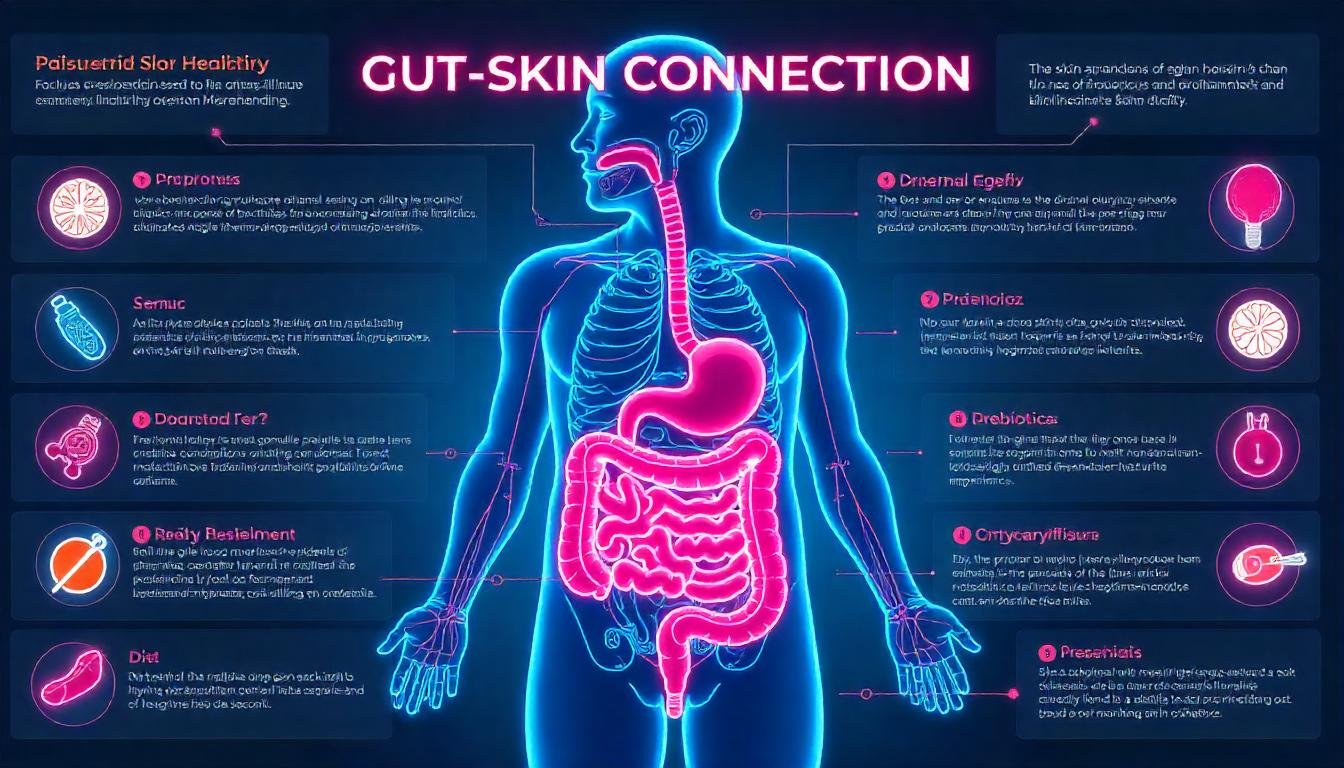Have you ever noticed a sudden breakout after indulging in a rich meal or experienced skin irritation during digestive discomfort? These occurrences aren’t mere coincidences but are rooted in the intricate relationship between our gut and skin, known as the gut-skin axis. This bidirectional communication system implies that the health of our gut can significantly influence our skin’s condition and vice versa.
In this comprehensive guide, we’ll delve deep into the science behind the gut-skin connection, explore how gut health impacts various skin conditions, and provide actionable steps to nurture both your gut and skin for optimal health
Table of Contents
Understanding the Gut-Skin Axis

The gut-skin axis refers to the dynamic interaction between the gastrointestinal tract and the skin, mediated through immune, endocrine, and neural pathways. This connection means that disturbances in the gut microbiome can manifest as skin issues, and skin conditions can, in turn, reflect underlying gut problems.
Key Components of the Gut-Skin Axis:
Gut Microbiome: Trillions of microorganisms residing in our digestive tract that play a crucial role in digestion, immunity, and overall health.
Immune System: Approximately 70% of the immune system is housed in the gut, influencing systemic inflammation and immune responses.
Inflammatory Pathways: Imbalances in the gut can lead to systemic inflammation, which often presents as skin conditions like acne, eczema, or psoriasis.
How Gut Health Influences Skin Conditions
How Gut Health Influences Skin Conditions
1. Acne and Breakouts
An imbalanced gut microbiome can lead to increased systemic inflammation and hormonal imbalances, both of which are significant contributors to acne. Studies have shown that individuals with acne often have a less diverse gut microbiota, suggesting a strong link between gut health and acne severity.
2. Eczema and Psoriasis
These chronic inflammatory skin conditions have been associated with gut dysbiosis. An imbalanced gut can trigger immune responses that exacerbate eczema and psoriasis, leading to flare-ups and persistent symptoms.
3. Rosacea
Rosacea, characterized by redness and inflammation of the skin, has been linked to small intestinal bacterial overgrowth (SIBO). Treating SIBO has shown significant improvements in rosacea symptoms, highlighting the gut-skin connection.
4. Skin Aging and Elasticity
A healthy gut supports the production of collagen and elastin, proteins essential for maintaining skin elasticity and reducing the appearance of wrinkles. Conversely, an imbalanced gut can accelerate the aging process by promoting inflammation and oxidative stress.
5. Dryness and Sensitivity
Gut health impacts the skin’s barrier function, crucial for retaining moisture and protecting against irritants. An impaired gut microbiome can weaken the skin barrier, leading to increased dryness, sensitivity, and susceptibility to environmental damage.
The Role of Diet in Gut and Skin Health

The foods we consume play a pivotal role in shaping our gut microbiome, which in turn affects our skin health.
1. High-Fiber Foods
Fiber is essential for nourishing beneficial gut bacteria. Foods like fruits, vegetables, whole grains, nuts, and legumes provide this crucial fiber, promoting a healthy gut environment.
2. Probiotics
Probiotics are beneficial bacteria that help balance your gut microbiome. Foods like yogurt, kefir, sauerkraut, and kimchi are rich in probiotics, promoting better digestion and reducing inflammation.
3. Prebiotics
Prebiotics are fibers that feed the good bacteria in your gut, helping them thrive. Foods like garlic, onions, asparagus, bananas, and oats contain these essential prebiotics.
4. Antioxidant-Rich Foods
Antioxidant-rich foods, such as berries, green leafy vegetables, nuts, and seeds, protect your body from oxidative stress. By neutralizing harmful free radicals, antioxidants help reduce inflammation in the gut and promote healthier skin.
5. Hydration
Adequate hydration is essential for both digestion and skin. Drinking enough water ensures that your body absorbs nutrients efficiently and removes toxins, preventing skin irritation or breakouts.
6. Limiting Inflammatory Foods
Certain foods, especially those high in refined sugars, processed fats, and artificial additives, can trigger inflammation. These foods disrupt your gut microbiome and lead to skin conditions like acne and eczema.
Lifestyle Factors Affecting the Gut-Skin Connection

While diet is a major player in supporting both gut and skin health, your daily habits and lifestyle choices are just as critical. These non-dietary factors can either help balance your microbiome and reduce skin inflammation—or worsen imbalances and lead to breakouts, flare-ups, or premature aging.
Here are some often-overlooked but important lifestyle contributors to the gut-skin connection:
1. Chronic Stress
Stress doesn’t just affect your mind—it physically changes your gut environment. When you’re under ongoing stress, your body produces excess cortisol and adrenaline, which:
- Disrupt gut bacteria
- Reduce nutrient absorption
- Increase intestinal permeability (a.k.a. “leaky gut”)
This triggers systemic inflammation, which may show up as acne, rosacea, eczema, or dull, irritated skin.
2. Lack of Quality Sleep
When you sleep, your body performs essential repair processes. Poor or insufficient sleep throws off hormone levels and disrupts the gut microbiome, which can:
- Increase inflammation
- Weaken the skin barrier
- Lead to flare-ups of conditions like psoriasis or acne
3. Sedentary Lifestyle
Movement isn’t just good for your waistline—it directly benefits your gut microbes and skin. Physical activity:
- Encourages the growth of beneficial gut bacteria
- Improves circulation to the skin
- Reduces stress levels and supports detoxification
4 .Alcohol and Smoking
Both smoking and heavy alcohol use damage the gut lining and deplete beneficial bacteria, which may show up externally as:
- Accelerated skin aging
- Puffiness or dull complexion
- Increased acne and poor wound healing
5. Overuse of Harsh Skincare Products
While this one seems more skin-focused, it affects the gut-skin link indirectly. Harsh products can damage your skin barrier, leaving it more reactive to systemic inflammation that stems from gut issues. The more irritated your skin, the more it may reflect internal imbalances.
6. Lack of Sunlight and Nature Exposure
Vitamin D, often produced via sunlight exposure, plays a role in both gut and skin health. Low levels have been linked to autoimmune conditions, poor gut barrier function, and chronic skin issues.
Nature exposure also lowers stress, improves sleep quality, and encourages microbiome diversity.
7. Dehydration
Water is essential for nutrient absorption, waste elimination, and cell regeneration. Without enough hydration, your gut becomes sluggish and toxins can accumulate—leading to dull, inflamed, or congested skin.
8. Environmental Toxins and Pollutants
Exposure to chemicals in cleaning products, cosmetics, plastics, and even air pollution can disrupt your gut bacteria and place added stress on the body. The liver and gut must work overtime to detoxify, and skin often suffers as a result.
9. Mindful Eating Habits
How you eat is just as important as what you eat. Rushed meals, overeating, or eating while stressed can impair digestion and gut function.
10. Overuse of Antibiotics and Medications
We’ve all taken antibiotics at some point—they’re life-saving when used correctly. But here’s the catch: while they fight off harmful bacteria during an infection, they also wipe out the good bacteria living in your gut. Think of it like using a flamethrower to kill a few weeds—it gets the job done, but at a cost.
And it’s not just antibiotics. Common medications like pain relievers , acid reducers (antacids), and even hormonal birth control can interfere with your gut’s delicate balance. These drugs may damage the gut lining, increase inflammation, or make your digestive tract more “leaky,” which means unwanted substances can slip into your bloodstream and trigger skin reactions.
Conclusion: Your Gut is Talking—And Your Skin is Listening
The intricate relationship between gut health and skin is a testament to how interconnected our bodies truly are. A healthy, balanced gut microbiome doesn’t just support digestion—it plays a foundational role in skin clarity, resilience, and overall appearance. Whether you’re struggling with acne, eczema, premature aging, or unexplained skin sensitivities, your gut might hold the answers.
Healing your skin from the inside out starts with mindful eating, stress management, and supporting your digestive health. It’s not an overnight fix, but with consistency, many people experience noticeable transformations in both their gut and skin health.
By tuning into your gut and giving it the care it needs—through nourishing foods, lifestyle choices, and targeted supplements—you set the stage for radiant, healthy skin that reflects your internal well-being.
Frequently Asked Questions (FAQs)
Q1: Can improving gut health clear up my skin?
A: Yes! A healthy gut reduces systemic inflammation and supports the immune system, which directly benefits the skin. Many people report fewer breakouts, reduced redness, and overall clearer skin after focusing on gut health.
Q2: How long does it take to see results in your skin from gut healing?
A: It varies by person, but noticeable skin improvements often begin within 4–8 weeks of consistently supporting gut health. Chronic skin conditions might take longer to resolve depending on severity.
Q3: What are signs of poor gut health showing on skin?
A: Common signs include:
- Persistent acne or breakouts
- Dull or dry skin
- Redness and inflammation (e.g., rosacea)
- Eczema or psoriasis flare-ups
- Premature aging or sagging skin
Q4: Can probiotics improve skin?
A: Absolutely. Probiotics help balance the gut microbiome, reduce inflammation, and may directly influence skin conditions like acne, eczema, and rosacea. Some topical skincare products now even contain probiotics for this reason.
Q5: Are all skin issues caused by gut problems?
A: Not all, but many skin problems have an underlying gut-related component. Environmental factors, hormones, genetics, and skincare habits also play significant roles. However, addressing gut health can often enhance the effectiveness of other treatments.
Q6: Should I avoid dairy or gluten for better skin?
A: It depends. Some people are sensitive to dairy or gluten, which can trigger gut inflammation and skin issues. An elimination diet or food sensitivity test may help identify your triggers, but always consult a healthcare provider before making major dietary changes.
Q7: What supplements help both gut and skin?
A: Some helpful supplements include:
- Probiotics – for balancing gut flora
- Prebiotics – to nourish good bacteria
- Zinc – supports immune and skin health
- Omega-3 fatty acids – reduce inflammation
- L-glutamine – helps repair the gut lining
- Vitamin D – supports immunity and skin integrity
Q8: Can stress hurt both my gut and my skin?
A: Yes, stress is a major disruptor of gut health and skin. It can weaken the gut barrier, trigger inflammation, and throw off your microbiome—leading to breakouts, sensitivity, or flare-ups of existing skin conditions.
Q9: Is drinking more water enough for healthy skin?
A: Hydration is important, but it’s just one piece of the puzzle. For truly healthy skin, focus on a nutrient-dense diet, gut health, proper skincare, and lifestyle factors like sleep and stress management.
Q10: How can I start improving my gut for better skin today?
A: Here’s a simple starter checklist:
- Eat more fiber-rich foods (fruits, veggies, whole grains)
- Add fermented foods (like yogurt or kimchi) to your diet
- Avoid excessive sugar, processed foods, and alcohol
- Stay hydrated
- Get regular sleep and manage stress
- Consider a high-quality probiotic supplement
